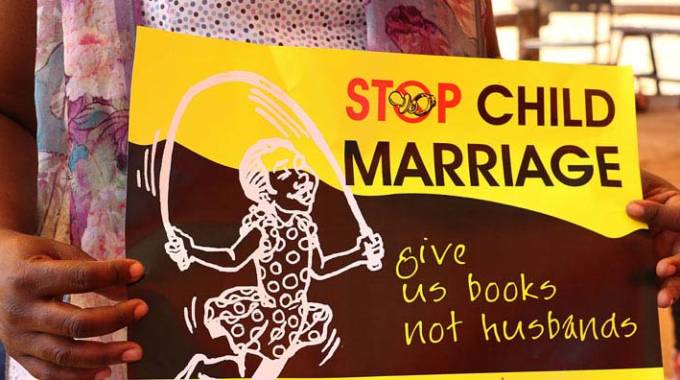
The ManicaPost

Memory Matsikure
IN this COVID 19 era, child marriages is a peril that seems to be worsening.
Zimbabwe is among the numerous nations distressed by child marriages.
According to UNICEF, 12 million girls worldwide are married every year before they turn 18.
A total of 650 million girls and women alive today were married before the age of 18.
Moreover, according to the United Nations, 37 000 girls under the age of 18 are married each day, with one in three girls in the developing world married before 18.
One in nine are married before the age of 15.
Hence child marriage is a social justice issue.
Mudimba argues that in the midst of the Covid-19 pandemic, child marriages are a silent crises raging on across the world, Zimbabwe included.
He highlighted that at the start of this year’s academic year, hundreds of girls could not return to school as they had fallen victim to child marriages.
While child marriage cases have escalated due to Covid-19, the disharmony in Zimbabwe’s law is also contributing to the challenges being faced in curbing the vice.
This calls for realignment of the Marriage Act, the Customary Marriages Act and the Criminal Law (Codification and Reform) Act with the Constitution.
UNICEF defines child marriage as any formal marriage or informal union between a child under the age of 18 and an adult or with another child.
The Criminal Law (Codification and Reform) Act [Chapter 9:23] contains a provision in Section 70 which criminalises sexual intercourse between an adult and a young person below the age of 16.
However, it does not criminalise by implication, sexual relations in marriage between a male adult and a minor.
In Zimbabwe, the age of consent to sex is 16 while the age of consent to marriage at 18 years.
Early sexual activity is therefore separated from the issue of child marriages, and yet most young girls get into early marriages due to early pregnancies.
Some organisations have therefore been advocating for the age of consent to sex to be lifted to 18 in a bid to further protect the girl child against predation by older man.
According to the Constitutional Court in the matter between Loveness Mudzuru and Tsopodzo in 2016, the Ministry of Justice outlawed the marriage of persons below the age of 18 by striking down Section 22(1) of the Marriage Act.
Empirical evidence provided by the Constitutional Court in the Mudzuru matter revealed the harmful impact of early marriages on the girl child.
Therefore, Section 22(1) of the Marriage Act was found to be contrary to the welfare of children.
In the above legislation, co-habitation (universal partnerships/civil partnerships) with children is not prohibited.
The only available remedy at the moment is to remove a child from such a set-up.
Providing criminal punishment to perpetrators of child marriages is in line with the SADC Model Law on ending child marriages.
The criminal sanctions for perpetrators and facilitators of child marriages in the Bill need to be stern enough to dissuade would-be offenders.
Currently, Zimbabwe is debating a new Marriages Bill, which will see civil and customary marriages synchronised into one Bill.
This Bill emphasizes protecting children from being forced into marriage before they are 18 years old.
This alignment means the minimum age of 18 years will apply to all forms of marriage.
However, there is need to consider the shortcomings in the proposed Marriage Bill.
These include addressing age of consent to sexual activity, defining customary marriages to ensure that no loopholes will be exploited to pave way for child marriages.
The Bill is also silent on religious marriages which may see children getting into unions akin to marriages.
Also, there is need to put in place measures to ensure that age is not misrepresented before Chiefs and marriage officers.
Intense use of community psychology principles, values and strategies by key stakeholders such as the Government and civic society in aligning the laws and implementing programmes that address child marriages will enhance community well-being.
Community psychology emphasises on prevention; promoting social justice; lessening social inequalities; minimising social disadvantage and segregation; and extinguishing ignorance in a bid to eradicate social ills such as child marriages and its negative effects on the girl child and the community.
Social Action, whereby members of community come together to implement various programmes, will help in fighting child marriages.
Emancipatory education and consciousness raising to take away forms of oppression and inequality leading to child marriages can also be useful.
Communities can also conduct asset mapping of their resources to curb child marriages and engage community members.
Community empowerment is crucial in the fight against child marriages.
Community focus group discussions, advocacy and lobbying can provide lasting solutions.
Stakeholder mobilisation is also essential in effective implementation of programmes to end child marriages.
Memory Matsikure is a community psychology inter



